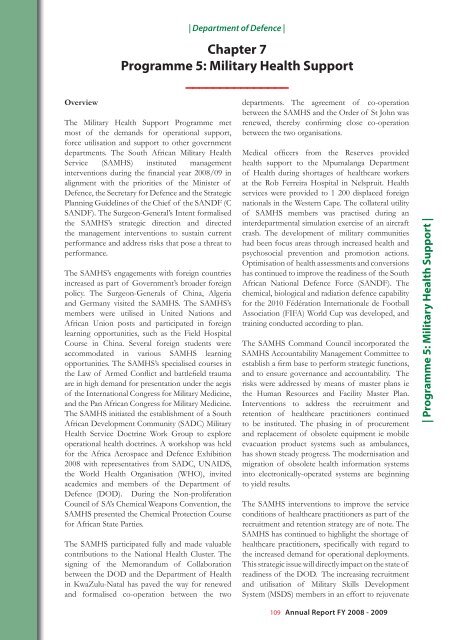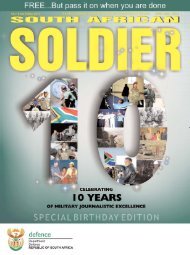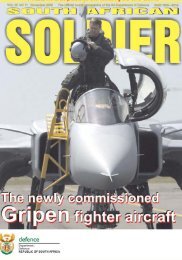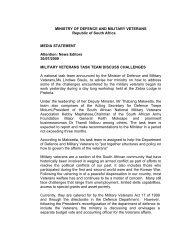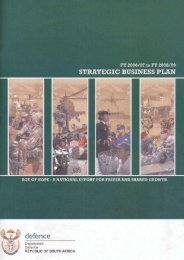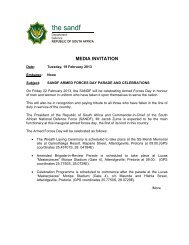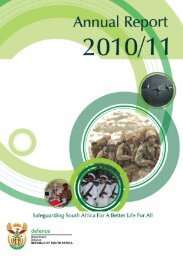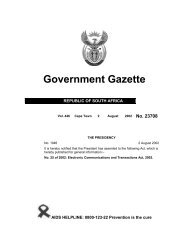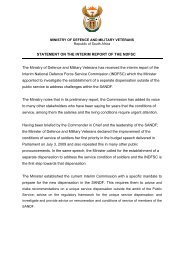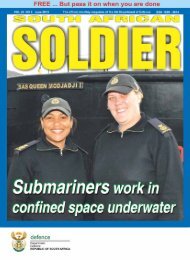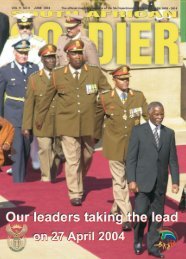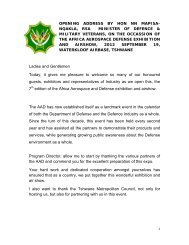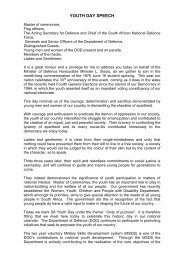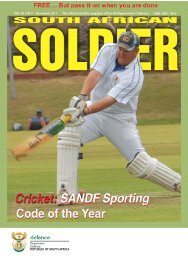Department of Defence Annual Report 2008-2009
Department of Defence Annual Report 2008-2009
Department of Defence Annual Report 2008-2009
- No tags were found...
Create successful ePaper yourself
Turn your PDF publications into a flip-book with our unique Google optimized e-Paper software.
| <strong>Department</strong> <strong>of</strong> <strong>Defence</strong> |<br />
Chapter 7<br />
Programme 5: Military Health Support<br />
Overview<br />
The Military Health Support Programme met<br />
most <strong>of</strong> the demands for operational support,<br />
force utilisation and support to other government<br />
departments. The South African Military Health<br />
Service (SAMHS) instituted management<br />
interventions during the nancial year <strong>2008</strong>/09 in<br />
alignment with the priorities <strong>of</strong> the Minister <strong>of</strong><br />
<strong>Defence</strong>, the Secretary for <strong>Defence</strong> and the Strategic<br />
Planning Guidelines <strong>of</strong> the Chief <strong>of</strong> the SANDF (C<br />
SANDF). The Surgeon-General’s Intent formalised<br />
the SAMHS’s strategic direction and directed<br />
the management interventions to sustain current<br />
performance and address risks that pose a threat to<br />
performance.<br />
The SAMHS’s engagements with foreign countries<br />
increased as part <strong>of</strong> Government’s broader foreign<br />
policy. The Surgeon-Generals <strong>of</strong> China, Algeria<br />
and Germany visited the SAMHS. The SAMHS’s<br />
members were utilised in United Nations and<br />
African Union posts and participated in foreign<br />
learning opportunities, such as the Field Hospital<br />
Course in China. Several foreign students were<br />
accommodated in various SAMHS learning<br />
opportunities. The SAMHS’s specialised courses in<br />
the Law <strong>of</strong> Armed Conict and battleeld trauma<br />
are in high demand for presentation under the aegis<br />
<strong>of</strong> the International Congress for Military Medicine,<br />
and the Pan African Congress for Military Medicine.<br />
The SAMHS initiated the establishment <strong>of</strong> a South<br />
African Development Community (SADC) Military<br />
Health Service Doctrine Work Group to explore<br />
operational health doctrines. A workshop was held<br />
for the Africa Aerospace and <strong>Defence</strong> Exhibition<br />
<strong>2008</strong> with representatives from SADC, UNAIDS,<br />
the World Health Organisation (WHO), invited<br />
academics and members <strong>of</strong> the <strong>Department</strong> <strong>of</strong><br />
<strong>Defence</strong> (DOD). During the Non-proliferation<br />
Council <strong>of</strong> SA’s Chemical Weapons Convention, the<br />
SAMHS presented the Chemical Protection Course<br />
for African State Parties.<br />
The SAMHS participated fully and made valuable<br />
contributions to the National Health Cluster. The<br />
signing <strong>of</strong> the Memorandum <strong>of</strong> Collaboration<br />
between the DOD and the <strong>Department</strong> <strong>of</strong> Health<br />
in KwaZulu-Natal has paved the way for renewed<br />
and formalised co-operation between the two<br />
departments. The agreement <strong>of</strong> co-operation<br />
between the SAMHS and the Order <strong>of</strong> St John was<br />
renewed, thereby conrming close co-operation<br />
between the two organisations.<br />
Medical <strong>of</strong>cers from the Reserves provided<br />
health support to the Mpumalanga <strong>Department</strong><br />
<strong>of</strong> Health during shortages <strong>of</strong> healthcare workers<br />
at the Rob Ferreira Hospital in Nelspruit. Health<br />
services were provided to 1 200 displaced foreign<br />
nationals in the Western Cape. The collateral utility<br />
<strong>of</strong> SAMHS members was practised during an<br />
interdepartmental simulation exercise <strong>of</strong> an aircraft<br />
crash. The development <strong>of</strong> military communities<br />
had been focus areas through increased health and<br />
psychosocial prevention and promotion actions.<br />
Optimisation <strong>of</strong> health assessments and conversions<br />
has continued to improve the readiness <strong>of</strong> the South<br />
African National <strong>Defence</strong> Force (SANDF). The<br />
chemical, biological and radiation defence capability<br />
for the 2010 Fédération Internationale de Football<br />
Association (FIFA) World Cup was developed, and<br />
training conducted according to plan.<br />
The SAMHS Command Council incorporated the<br />
SAMHS Accountability Management Committee to<br />
establish a rm base to perform strategic functions,<br />
and to ensure governance and accountability. The<br />
risks were addressed by means <strong>of</strong> master plans ie<br />
the Human Resources and Facility Master Plan.<br />
Interventions to address the recruitment and<br />
retention <strong>of</strong> healthcare practitioners continued<br />
to be instituted. The phasing in <strong>of</strong> procurement<br />
and replacement <strong>of</strong> obsolete equipment ie mobile<br />
evacuation product systems such as ambulances,<br />
has shown steady progress. The modernisation and<br />
migration <strong>of</strong> obsolete health information systems<br />
into electronically-operated systems are beginning<br />
to yield results.<br />
The SAMHS interventions to improve the service<br />
conditions <strong>of</strong> healthcare practitioners as part <strong>of</strong> the<br />
recruitment and retention strategy are <strong>of</strong> note. The<br />
SAMHS has continued to highlight the shortage <strong>of</strong><br />
healthcare practitioners, specically with regard to<br />
the increased demand for operational deployments.<br />
This strategic issue will directly impact on the state <strong>of</strong><br />
readiness <strong>of</strong> the DOD. The increasing recruitment<br />
and utilisation <strong>of</strong> Military Skills Development<br />
System (MSDS) members in an effort to rejuvenate<br />
| Programme 5: Military Health Support |<br />
109 <strong>Annual</strong> <strong>Report</strong> FY <strong>2008</strong> - <strong>2009</strong>


